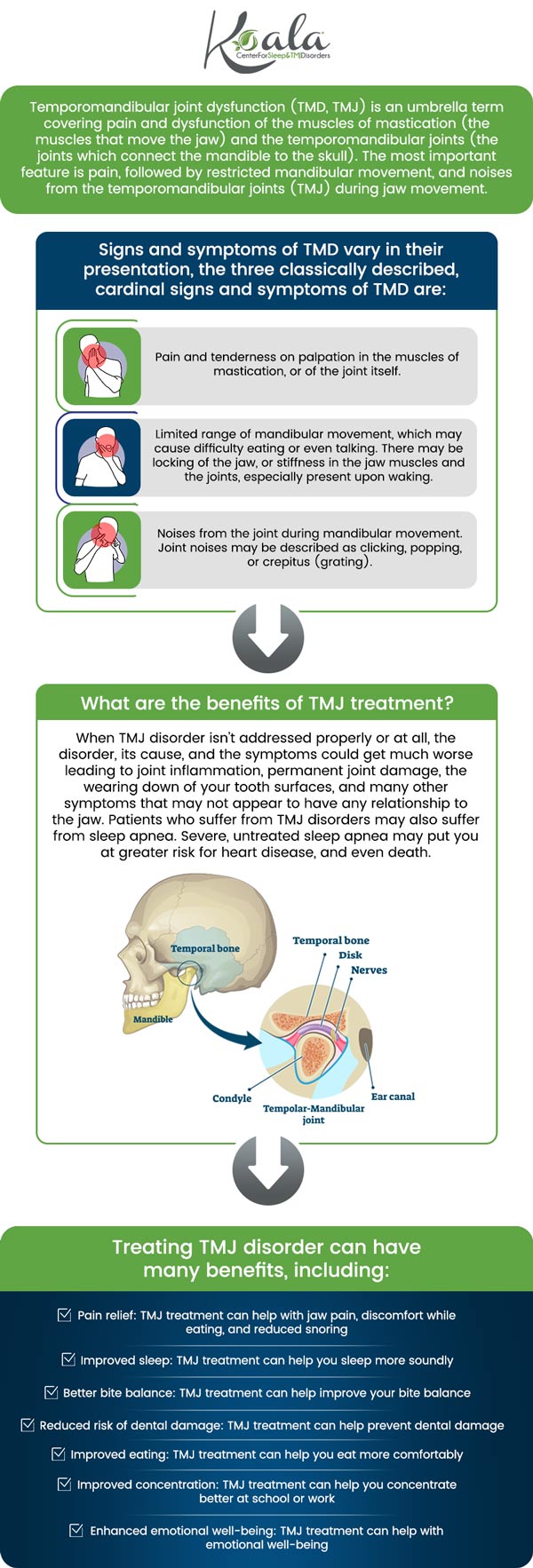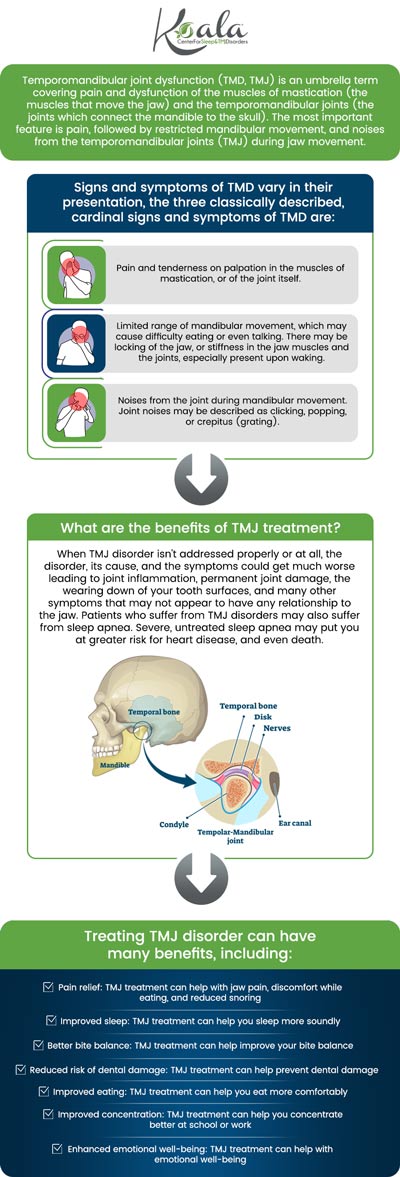TMJ Disorders – Diagnosis and Treatment Q/A
Approximately, 10 million Americans are affected by TMJ disorder. If you are one of those, come to Koala® Center For Sleep & TMJ Disorders for a diagnosis and treatment. For more information, contact us or visit us online to book an appointment. We have convenient locations across the U.S. in Bloomington IL, Peoria/Dunlap IL, El Paso TX and Wausau WI.




Table of Contents:
How are TMJ disorders diagnosed?
How do you treat TMJ disorder?
How long is the treatment for TMJ?
What happens if you have TMJ for a extended period of time?
Dysfunction of the jaw joint can cause a wide number of complications, from pain to popping sounds that occur when opening your mouth. Problems with the jaw joint are known as TMJ disorders; the TMJ, or temporomandibular joint, is the complex joint that connects the lower jaw (mandible) to the skull, enabling it with its sliding hinge-like motion. There are many problems that can occur with this joint and many nuances in its dysfunction because it is such an intricate joint.
The diagnosis of TMJ disorders usually starts with a dentist or doctor taking a medical and dental history and doing a physical examination. The physical examination includes feeling the jaw muscles and joints for tenderness or clicking and assessing the range of motion of the jaw. Imaging tests, such as X-rays, computerized tomography (CT) scans, and magnetic resonance imaging (MRI) scans, also may be used to diagnose TMJ disorders or to rule out other problems.
There are a lot of different ways that doctors can diagnose TMJ disorders. Many times, the doctor will ask about your symptoms and do a physical examination of your jaw and face. The doctor might also order X-rays or other imaging tests to take a closer look at your jawbone and joints. If the dentist suspects that you have a problem with how your teeth fit together, they might also order a dental exam.
TMJ pain treatments include:
– At-home care, including:
– rest
– cold/hot therapy
– posture correction
– Exercises and stretches
– Massage
– Stress management techniques
– Dental devices, mouth guards, or oral splints
– Physical therapy
– Medications, including muscle relaxants
– TENS unit therapy
– Injections, including Botulinum or corticosteroid
– Arthroscopic surgery (for severe cases)
The time it takes to treat TMJ disorder is dependent upon several factors, including:
– The severity of the condition
– Its duration
– The specific problem being addressed
– Overall condition of health
Some treatment options might go on for months, while others may only take a few weeks. In many cases, it typically takes a couple of months to see improvement from TMJ disorder, but this is highly dependent upon the specifics of each situation.
Untreated TMJ disorder can result in a long list of complications and limitations imposed upon quality of life. The longer the condition goes untreated, the more likely it is to require interventional methods for amelioration. Common complications of untreated TMJ disorder include:
– Chronic Jaw Pain
– Joint Damage and Inflammation
– Recurring Headaches
– Development of An Airway Sleep Disorder
All of these symptoms can interfere with your lifestyle and the way you live every day. Untreated TMJ pain has an impact on not only your sleep and the amount of oxygen you breathe at night, but also your mood, eating habits, and even how you sit and walk. Therefore, if you have TMJ pain that has persisted longer than a week, you should schedule an appointment with a TMJ disorder specialist as soon as possible.
The trusted sleep specialists at Koala® Center For Sleep & TMJ Disorders can help you overcome your TMJ disorder and improve your quality of life. We serve patients from all across the United States, and currently have seven locations, including: one in El Paso, TX; one in Wausau, WI; one in Mishawaka, IN; one in Peoria – Dunlap, IL; and one in Bloomington, IL. Schedule an appointment with an experienced TMJ disorder specialist at any of our locations today to receive top-level care! We look forward to serving you!

Additional Services You May Need
▸ KoalaKIDZzz®
▸ Sleep Apnea
▸ Snoring
▸ TMJ Disorder
▸ Fatigue
▸ Sleep Disorders
▸ Weight Loss
▸ CPAP Alternative
▸ Oral Appliances




